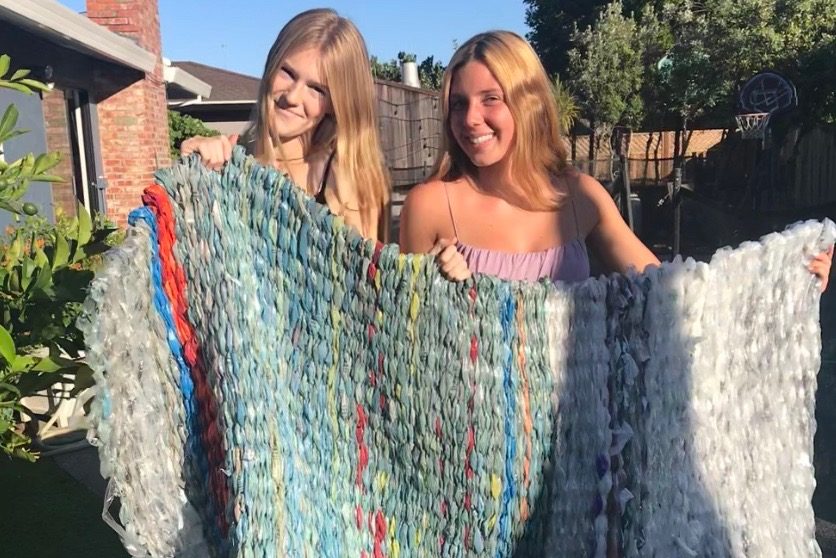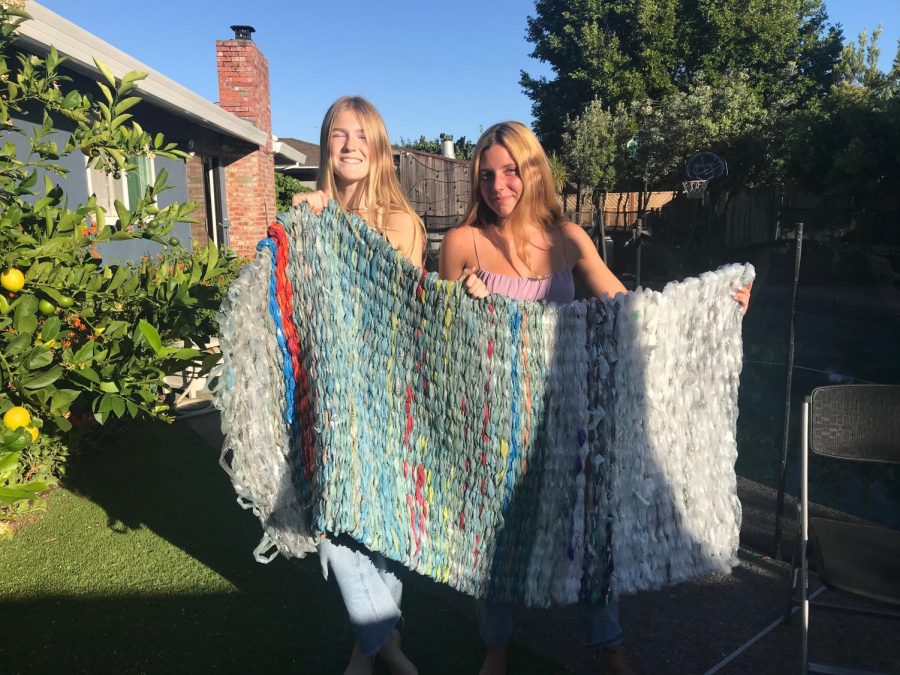Ecomats: Turning trash into comfort
Dec 18, 2020
For many, the last eight months of quarantine have been a difficult and isolating experience filled with an abundance of free time. Senior Genevieve Durham has used this opportunity to pursue a philanthropic idea and take action against two of the leading issues in our world: plastic pollution and homelessness.
Durham and her friend, Marin Academy senior Lucy Goldman, co-founded Ecomats, which is a charity organization repurposing plastic bags into sleeping mats for individuals experiencing homelessness. Each mat is made from hundreds of plastic bags made into ‘plarn.’ “Anybody can really make plastic yarn which is called ‘plarn’ and you can just cut up strips of plastic and you weave them together and it just forms these long chains of plastic yarn,” Durham said. “Then we take them and we have these looms that we can weave into long big mats.”
The idea for Ecomats was inspired by Durham’s involvement with the National Charity League (NCL), a national women-led and run non-profit organization focused on promoting community service and volunteerism. “We all were discussing how we could make a greater impact with a project in our NCL class … We have been working a lot with people experiencing homelessness and we were like ‘oh let’s do something with that and help them,’” Durham said.
A YouTube video of someone weaving plastic into various objects ignited the idea to use plastic to help homelessness. “We found this YouTube video of somebody weaving plastic … we were like ‘oh we could use that and make sleeping mats for the homeless’ because it provides a comfort on the concrete but also warmth,” Durham said.
The COVID-19 pandemic motivated Durham and Goldman to pursue turning plastic bags into mats for the homeless, “Then that idea kind of floated off and then once COVID-19 hit my friend and I were like, ‘ok let’s just get on this project’ so then we kind of took it in our own hands and made the project bigger and involved more people of our own.”
The pandemic worsened the issue of plastic waste, Durham observed. The emphasis on single-use items such as disposable masks, gloves, and plastic bags have increased plastic pollution, speeding up the harmful effects. Plastic has a lifespan of 450 years, which means that plastic items continue to pollute our planet long after someone has thrown them in the trash. “We saw the problem with plastic pollution and we were like this is so huge, ‘why do we have so much plastic?’ especially with COVID-19 not being able to use reusable bags… so we were like plastic pollution has gotten out of hand, it’s a problem we are kind of ignoring, then there’s this huge homeless problem in San Francisco … how can we put these two problems together?” Durham said. “It’s so clear you literally can just use [the plastic] to help somebody else … it’s just providing more comfort in someone else’s life which can make you feel good as well and also just necessary.”
In addition to the societal and environmental benefits, Durham wants Ecomats to bring the community together. “We saw that a lot of people probably felt unconnected [during COVID-19] … This was another way people could just get involved and meet new people. I know we were trying to involve The Redwoods (a local nursing home) … We were trying to just reach out and get people involved; younger kids are really into it especially when they have nothing much to do.”
Durham recently started a club at Tam for Ecomats. For now, club members make the plarn, and then Durham looms the actual mat together, however, that could change once COVID-19 precautions are loosened. “If we go back in person, we can use looms all together and make the mats together,” Durham said.
“Anybody can help and we have a club now so people can get involved – get involved guys!” Durham said. “On Zoom we just plarn together and talk and socialize … it’s really fun.”
The process of making one mat can take hours, but the end result is worth it. “We donate the mats to Saint Vincent De Paul Society of Marin … We roll them up, tie a bow on them, hand them to them … They were very grateful for them,” Durham said. “But if we get too many where we’ve made too many [mats] and they are not really being used, we might try another homeless shelter.”
Eco-mats helps to provide comfort for some individuals experiencing homelessness, in which the Bay Area places third for the largest population of homeless people, behind Los Angeles and New York, at over 28,000 homeless individuals. Currently, Ecomats has donated six mats to Saint Vincent De Paul Society of Marin, but they are planning on donating more mats in the near future.
Durham hopes that Ecomats will continue to expand beyond her graduation from Tam, “We would love for this to grow and for more people to get involved because we can always use more help especially when we go off to college … I think it’s just a great way to also have a group of people to do something with.”





